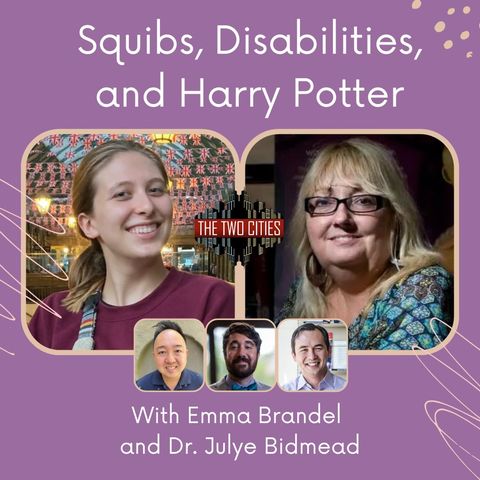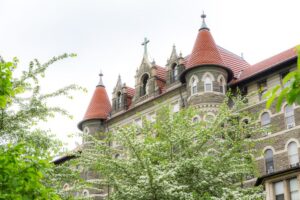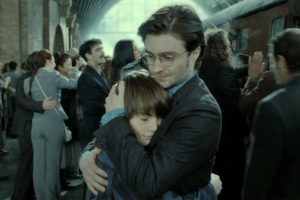Alt txt: Image of our guests, Emma Brandel and Dr. Julye Bidmead, as well as three of our cohosts: Dr. John Anthony Dunne, Stanley Ng, and Rev. Dr. Chris Porter.
Carrying on in our series on Disability & Theology, we turn to think critically about the representation of disabilities in popular culture. In particular, we’re focusing on the representation of Squibs in the Harry Potter series with Emma Brandel and Dr. Julye Bidmead. Emma Brandel is an undergraduate student at Chapman University (Orange, California) majoring in ancient cultures and languages, and Dr. Julye Bidmead is Associate Professor of Religious Studies and the Director of the Center for Undergraduate Excellence at Chapman University. Over the course of our conversation Emma and Dr. Bidmead highlight the ways that Squibs—magical born people in the Harry Potter world who are not able to use a wand to produce magic—function as a metaphor for people with disabilities. What is most problematic about this connection, as we discuss, is that there is no educational accommodation for Squibs at Hogwarts, and they are broadly denigrated within that magical society. This discussion stems from work that Emma did in a course taught by Dr. Bidmead in which she and a few of her fellow classmates produced a reading guide for people coming to the Harry Potter series 30 years later (or more) after readers have grown more sensitive to the unchecked biases in the series against various marginalized groups, including people with disabilities. Team members on the episode from The Two Cities include: Dr. John Anthony Dunne, Rev. Dr. Chris Porter, and, introducing for the first time on the podcast, Stanley Ng.
Series Disclaimer: We know that this space is fraught, and we don’t speak for every PWD. We may inevitably get some things wrong in this series, but we ask for your patience in advance since we think it’s more important to have the conversation than shy away from it out of fear of saying the wrong thing. At the same time, this is a learning process for all of us, and we want to maintain a posture of learning throughout the series and beyond. Thanks for listening!
You can find this new episode on Spotify, Apple Podcasts, Google Podcasts, Overcast, Breaker, Anchor, or wherever you get your podcasts. Check it out, subscribe for weekly episodes every Wednesday, and please give us a rating and review!





Leave a Reply
Your email is safe with us.